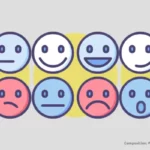
Today’s life is a stressful adventure, an ever-accelerating journey to nowhere that often ends up overwhelming us. To deal with everyday problems – and those not so everyday – we all put different coping strategies into practice.
You may not be fully aware of your coping strategies, but that doesn’t mean you don’t use them to deal with life’s stressful and conflicting situations. These coping strategies should have two essential objectives: to keep you afloat in the hardest moments and to solve the problem.
However, all coping strategies are not equally effective, psychologically mature and healthy. Some can even create more problems than they solve by causing you to hit bottom emotionally. Escapism is precisely one of them. And all of us, to a greater or lesser extent, are escapists.
What is escapism? Avoidance Psychology
Escapism is a coping strategy that involves the tendency to evade the real world in search of the long-awaited security and tranquility in a fantasy universe. It usually involves some degree of uprooting from reality to find refuge in a fictional parallel universe, although it can also involve fantasies related to a better, more powerful, successful or important “self”.
It is also known as Houdini syndrome, alluding to the powers of the mythical 19th-century Hungarian escapist. However, in Psychology, escapism is an avoidance mechanism that involves escaping from conflicts, problems, and/or daily responsibilities.
This avoidant coping strategy consists of ignoring the uncomfortable, unpleasant, or even dangerous situation to avoid the negative feelings and emotions it generates, such as worry, anguish, anxiety, or sadness. In practice, it consists of closing your eyes to the problem applying the old saying: eyes that do not see, heart that does not feel.
The most common escapist strategies to evade reality
There are different ways to escape from a reality that we do not like. Some people can spend hours trying to unlock the next level of a video game while others get lost in the black hole of social media. There are those who immerse themselves in marathons of series and those who fade between the pages of a book or get involved in activities that make no sense when they have much more important and urgent things to do.
It is no coincidence that a study conducted at the Universität Mannheim revealed that the number of hours adults spend watching television is an indicator of their level of escapism. These psychologists discovered that those who experience a lower need for self-reflection and introspection tend to spend more hours a day watching television.
In today’s world, the preferred form of escapism consists of the compulsive need to be constantly involved in electronic life, searching for seemingly important information, playing games, or poking around on social media. In fact, several studies, including one carried out at Duzce University, have found a connection between the time we spend on social networks and the Internet in general and the tendency to escapism.
Even travel can be an escapist strategy, as researchers from the University of Surrey have indicated, especially when the objective of these trips is not to discover a new place but simply to escape from the place where we find ourselves because it is unbearable.
Of course, drugs and alcohol are also an extreme escapist strategy since they alter our cognitive functions, produce a disconnection from our “self” and make it easier for us to ignore reality, also causing great physical and psychological damage.
Therefore, we could refer to different types of escapist strategies:
• Situational avoidance. This is the escapist strategy par excellence since it consists of actively avoiding situations that cause us discomfort. For example, we can avoid going to a party to avoid seeing a person or not taking a plane because of claustrophobia. In fact, situational avoidance is a common strategy used by people who suffer from all kinds of phobias.
• Cognitive avoidance. It consists of escaping from reality keeping your mind busy. It generally materializes through busy schedules, without a free slot. By saturating ourselves with tasks and obligations, we don’t have time to think or remember what worries us. However, this type of escapism often takes us to the edge of our strength, causing psychological and physical damage due to extreme exhaustion.
• Emotional avoidance. This strategy focuses on exchanging one feeling for another since we consider that the first one is not adequate. For example, we can change hate to sadness because we consider that it is more acceptable to feel sad than to hate someone. It is a more complex avoidance mechanism by which we avoid letting our real feelings flow, putting other emotions in their place. However, in the long run, emotional avoidance only generates great tension that will end up coming to light in the worst way.
• Somatic avoidance. Also known as interoceptive avoidance, it involves concentrating on the body to avoid thinking about certain situations or to put off making decisions. For example, if we don’t want to recognize that a relationship is going badly or that our work is not satisfactory, we could somatize this discomfort through different symptoms. Focusing on the physical discomfort will prevent us from thinking about the problem that causes it, but, obviously, it will not solve it. In fact, when the somatization of problems becomes a long-standing strategy, it often leads to the appearance of diseases.
• Protective avoidance. This escapist strategy consists of keeping ourselves in a security zone in which we feel safe. For example, a person who likes to travel but suffers from claustrophobia may plan trips by sea or land to feel safer and avoid anxiety. Although it does not solve the problem, it gives us some freedom and maintains a balance, so in some cases it can be adaptive.
In reality, each one chooses his/her preferred escape method and plunges into the alternate universe that he/she has created for him/her, to evade a reality that is overwhelming and with which he does not want to deal.
From healthy avoidance to toxic escapism

We all have an escapist inside. From time to time we feel the need to change, disconnect, restart… That’s why we take vacations, read novels, watch television or videos of kittens on the Internet.
Sigmund Freud himself believed that the desire to escape is part of the human condition. “People cannot subsist on what little satisfaction they can steal from reality,” he wrote.
The desire to escape, in itself, is neither good nor bad. In some cases, the function of escapist strategies is to allow us to better deal with a world that is too overwhelming, a world that seems impossible to manage and that threatens to shatter a “self” that is not going through its best moment.
Taking a break, relaxing and disconnecting from certain concerns can be healthy. From time to time you want to travel to a more comfortable world, without responsibilities, without problems, without fights. Those moments can help us to assume the necessary psychological distance to solve the problem.
However, when escapism becomes the “SOLUTION”, the non-coping strategy par excellence, it is likely that sooner or later we will have a problem, in capital letters, much bigger than the problem we were trying to escape from.
Stop running away and start facing
Since we all, to a greater or lesser extent, put escapist strategies into practice, it is important that we be aware of them. Virtually any activity can become an outlet for reality, and many of these behaviors may even seem positive. The key lies in asking ourselves if it is an excuse to avoid the necessary self-reflection.
Drinking a glass of wine listening to music after a long day at work can be a nice way to relax. But if you walk through the door looking for the bottle because you can’t deal with the reality of your home or your life, you need to stop and ask yourself what problem you have to solve.
Going on a trip just because you feel like disconnecting is a good idea to protect your psychological balance and rediscover yourself. However, if you go on that journey because you want to get away from your partner, you have a relationship problem that you need to fix.
The more time we spend escaping, the less time we will have to reflect on what is happening to us and what we are feeling. We need to be aware that constantly running will not leave fears behind, it will only exacerbate them because there is no place in the world where you can run away from yourself.
A study conducted at Leiden University warns us that people who constantly avoid dealing with their intense emotions experience greater feelings of anxiety and emotional distress over time. And it is that the tendency to psychological escapism can become a dangerous snowball that runs down the mountain. The problem will continue to grow as long as we feel “safe” in another universe.
For this reason, it is important to remember that as comforting as it is to escape between the pages of books, social networks, television or any other activity that allows us to disconnect from worries, problems do not usually disappear on their own, just as do not will disappear stressful situations or the conflicts that generated them.
Although escapism can serve as a one-off stress coping technique when we feel overwhelmed, we need to be mature enough to know when it’s time to come back to reality and deal with the problem.
As long as we continue to avoid the problem, the tension will remain a buzz in the background because the latent conflict is not resolved. And this will lead us to want to avoid a reality that is increasingly threatening, trapping us in a vicious circle.
The 3 questions to regain control of your life
1. The first step to breaking the escapist loop is to recognize that we are running away. To do this, it is enough answering a question honestly: Does what we are doing help us solve the problem? Maybe what we are doing may provide some immediate comfort, but it is not a long-term solution.
2. The second step is to detect exactly what we are escaping from, what problem overwhelms us. To do this, we can ask ourselves another simple question: What bothers/scares/worries us? We will have to dive within ourselves to find the answer, since it is not always easily available, especially when it comes to significant and sensitive issues that affect our psychological balance or life as we conceive it.
3. And the third step lies in looking for solutions that allow us to solve what worries us or, at least, mitigate the tension that it generates. It will help us to ask ourselves: How do I want my life to be? It is about projecting ourselves into the future to imagine not only how we want to live but also the person we would like to become.
Last but not least, we need to get down to earth to fix the problem. Introspection is of little use if we do not put into practice what we discover. Escapism is resolved with coping. And coping means actions. After all, as Carl Jung said “You are what you do, not what you say you are going to do”.
Sources:
Kırcaburun, K. & Griffiths, M. D. (2019) Problematic Instagram Use: The Role of Perceived Feeling of Presence and Escapism. International Journal of Mental Health and Addiction; 17(4): 909-921.
Spinhoven, P. et. Al. (2017) Experiential Avoidance and Bordering Psychological Constructs as Predictors of the Onset, Relapse and Maintenance of Anxiety Disorders: One or Many? Cognitive Therapy and Research; 41(6): 867–880.
Ohno, S. (2016) Internet escapism and addiction among Japanese senior high school students. International Journal of Culture and Mental Health; 9(4): 399-406.
Igorevna, O. O. (2015) Escapism: current studies and research prospects in contemporary psychology. Austrian Journal of Humanities and Social Sciences; 3-4 (1): 103-105.
Cohen, S. (2010) Searching for escape, authenticity and identity: Experiences of lifestyle travellers. In: M. Morgan, P. Lugosi & J.R.B Ritchie (Eds.) The Tourism and Leisure Experience: Consumer and Managerial Perspectives (pp. 27-42). Bristol: Channel View Publications.
Henning, B. B. & Vorderer, P. (2001) Psychological escapism: Predicting the amount of television viewing by need for cognition.Journal of Communication ; 51(1): 100 – 120.
Longeway, J. L. (1990) The Rationality of Escapism and Self-Deception. Behavior and Philosophy; 18(2): 1-20.




Charless says
Hello I am a junior in high school and really enjoyed this piece on escape. I would like to know who wrote this article on Escapism because I have a paper due and would love to cite this article correctly. This would help for my work cited page.
Jennifer Delgado says
Hello Charless, I write this article. My name is Jennifer Delgado and I’m a psychologist who lives in Spain and Psychology-spot.com is my own blog in english. You can cite me in your paper. Thank you for reading me.
brittany says
I was curious what the publication place and date were for the article.
Jennifer Delgado says
31 october 2019…